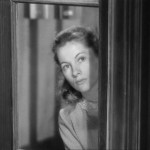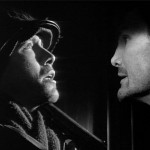Tag: Region: America
-
Black Water (1992)
But Black Water is first and foremost a novel about Kelly Kelleher and, by analogy, all other women who have been abused, exploited, and discarded by the powerful and by the media that report it.
-
The Public Burning (1976)
At the site of the execution—fantastically transposed from Sing Sing to the middle of Times Square—Nixon appears with his pants around his ankles, fully erect, then brings the crowd to a riotous frenzy as history dissolves around them.
-

Letter from an Unknown Woman (1948)
Letter essentially follows the trajectory of a Thomas Hardy novel: Lisa pines desperately, refuses the proposal of an honorable suitor, and abandons her parents — all sacrifices made to her absurd romantic delusions.
-

Benito Cereno (1855)
As Mike Frank has recently asked, “What might narratology look like if we were to take cinema — particularly ‘classical Hollywood cinema’ — as the paradigmatic instance of storytelling?”
-
The Woman Warrior (1975)
Reading The Woman Warrior now, twenty-five years after its original publication, I find it difficult to separate the actual text from the cultural milieu in which it was written.
-

The Man Who Wasn’t There (2001)
The problem with The Man is that the Coens have invested a character with genuine pathos, but seem to have done so only in the interest of later undercutting it with their typical brand of cynical Nihilism.
-
Another Country (1962)
Baldwin is so determined to explode the intersections of race, gender, and sexuality that he makes a fatal mistake: instead of being particularly insightful or even shocking, Another Country is preachy, sentimental, and, worst of all, boring.
-
Broom of the System (1987)
Lenore Beadsman’s life is complicated. The 24 year old heir to the Beadsman baby food empire struggles to balance her career as a call center operator — where the lines of communication seem perpetually crossed — with her, um, complex relationship with her boss, Rick Vigorous, of Frequent and Vigorous Publishing.
-
Their Eyes Were Watching God (1937)
In the opening chapters of Their Eyes Were Watching God, an elderly African-American woman sits down with her granddaughter and explains the main lesson she has learned during her difficult life, one that has spanned from the final years of slavery to the more promising days of the twentieth century.
-
O Pioneers (1913)
Willa Cather was nearly 40 years old in 1913 when she published O Pioneers!, her second novel. It’s difficult, then, to overlook the obvious similarities between her own life and that of her heroine, Alexandra Bergson.
-

Attack! (1956)
The following was written for a graduate seminar on Cold War military history. It examines the confluence of social, political, and economic events that allowed the financing and production of such an ambivalent anti-war film in Eisenhower America.
-

Eyes Wide Shut (1999)
The following was written for a graduate seminar on James Joyce and W.B. Yeats. Please forgive the fumbling psycho-babble. I think it actually serves a very legitimate reading of this film.
-
Buried Child (1978)
With his return, Vince takes on his legacy, the house itself and the secrets buried around and within it. He also takes on its pain.
-
The Basic Training of Pavlo Hummel (1971)
As is the case when I watch Full Metal Jacket, I find Pavlo Hummel much more interesting when viewed in this light—as an examination of “the eternal human pageant,” that constant process of interaction, performance, and construction.
-
Angels in America: Millennium Approaches (1992)
Note: These are my initial thoughts on Millennium Approaches, written as a journal assignment in the fall of 1998. I’m tempted to revise it or pull it down altogether, but I’ve decided to keep it up here as an artifact of sorts.
-
Fefu and Her Friends (1977)
To be quite honest, I don’t get Fornes’s play. But in this case (as opposed to a few other works I’ve read which have left me similarly perplexed), I feel somewhat driven to figure it out. I’ve decided to begin with the first clue Fornes gives us, the title. Following are my general impressions of Fefu and her friends: